句子基本结构练习
句子结构(1)五个基本句子结构

句子结构(1)五个基本句子结构句子结构(含be动词的简单句子)1. 第一句型的肯定句:(1) I am a boy. We are boys.(2) I am beautiful. We are beautiful.(3) I am a beautiful boy. We are beautiful boys.(4) She is a girl. They are girls.(5) He is a student. They are students.(6) It is a panda. They are pandas.(7) This is a book. These are books.(8) That is a pen. Those are pens.2. 第一句型的否定句(1) I am a boy. I am not a boy.(2) We are boys. We are not boys.(3) I am beautiful. I am not beautiful.(4) I am a beautiful boy. I am not a beautiful boy.(5) She is a girl.She is not a girl.(6) They are students. They are not students.(7) This is a book. This is not a book.(8) Those are pens. Those are not pens.第一句型的否定句: 直接在be 动词后加not英语所有否定句的构成: 3. 第一句型的一般疑问句(1) I am a boy. Are you a boy?(2) We are boys. Are you boys?(3) I am beautiful. Are you beautiful?(4) I am a beautiful boy. Are you a beautiful boy?(5) She is a girl. Is she a girl?(6) They are students. Are they students?(7) This is a book. Is this a book?(8) Those are pens. Are those pens?[1]第一句型的一般疑问句为: 直接将be (am ,is ,are)动词提至句首。
五种基本句子结构翻译练习
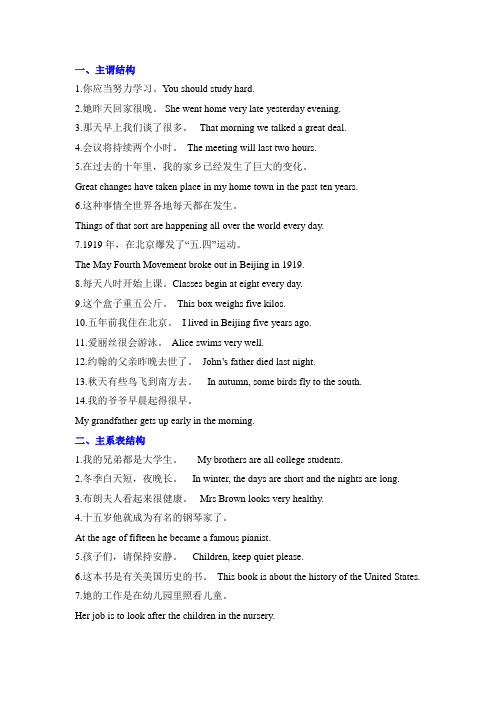
一、主谓结构1.你应当努力学习。
You should study hard.2.她昨天回家很晚。
She went home very late yesterday evening.3.那天早上我们谈了很多。
That morning we talked a great deal.4.会议将持续两个小时。
The meeting will last two hours.5.在过去的十年里,我的家乡已经发生了巨大的变化。
Great changes have taken place in my home town in the past ten years.6.这种事情全世界各地每天都在发生。
Things of that sort are happening all over the world every day.7.1919年,在北京爆发了“五.四”运动。
The May Fourth Movement broke out in Beijing in 1919.8.每天八时开始上课。
Classes begin at eight every day.9.这个盒子重五公斤。
This box weighs five kilos.10.五年前我住在北京。
I lived in Beijing five years ago.11.爱丽丝很会游泳。
Alice swims very well.12.约翰的父亲昨晚去世了。
John’s father died last night.13.秋天有些鸟飞到南方去。
In autumn, some birds fly to the south.14.我的爷爷早晨起得很早。
My grandfather gets up early in the morning.二、主系表结构1.我的兄弟都是大学生。
My brothers are all college students.2.冬季白天短,夜晚长。
句子结构练习
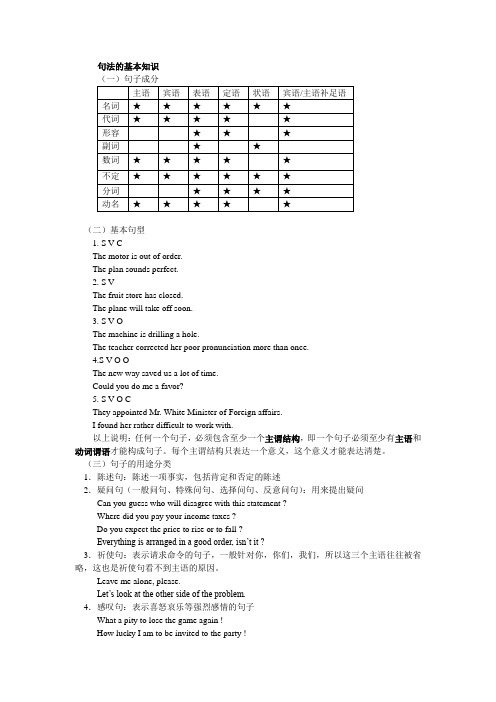
句法的基本知识(二)基本句型1. S V CThe motor is out of order.The plan sounds perfect.2. S VThe fruit store has closed.The plane will take off soon.3. S V OThe machine is drilling a hole.The teacher corrected her poor pronunciation more than once.4.S V O OThe new way saved us a lot of time.Could you do me a favor?5. S V O CThey appointed Mr. White Minister of Foreign affairs.I found her rather difficult to work with.以上说明:任何一个句子,必须包含至少一个主谓结构,即一个句子必须至少有主语和动词谓语才能构成句子。
每个主谓结构只表达一个意义,这个意义才能表达清楚。
(三)句子的用途分类1.陈述句:陈述一项事实,包括肯定和否定的陈述2.疑问句(一般问句、特殊问句、选择问句、反意问句):用来提出疑问Can you guess who will disagree with this statement ?Where did you pay your income taxes ?Do you expect the price to rise or to fall ?Everything is arranged in a good order, isn’t it ?3.祈使句:表示请求命令的句子,一般针对你,你们,我们,所以这三个主语往往被省略,这也是祈使句看不到主语的原因。
Leave me alone, please.Let’s look at the other side of the problem.4.感叹句:表示喜怒哀乐等强烈感情的句子What a pity to lose the game again !How lucky I am to be invited to the party !(四)句子的结构分类1.简单句:只有一个主语(并列主语)和一个谓语(并列谓语)V oices and music have been added to color and pictures to catch the ear as well as the eye.He stooped the car and waited for the red light to change to green.2.并列句:两个或两个以上的简单句用等立连词/ 分号/ 冒号/ 逗号连在一起的句子.等立连词包括:and, but, or, so, yet, still, however, while, whereas, for, not only---but also, either--- or, neither--- nor.Hurry up or you will be late for the meeting.Here the water is quiet, for there is little wind.Everyday the newspapers carry a few pages of classified ads; in the large Sunday editions there may be several sections of them.Sometimes I laugh, sometimes I am down.3.复合句:由一个主句或一个以上的从句构成的句子。
五种基本句型练习题
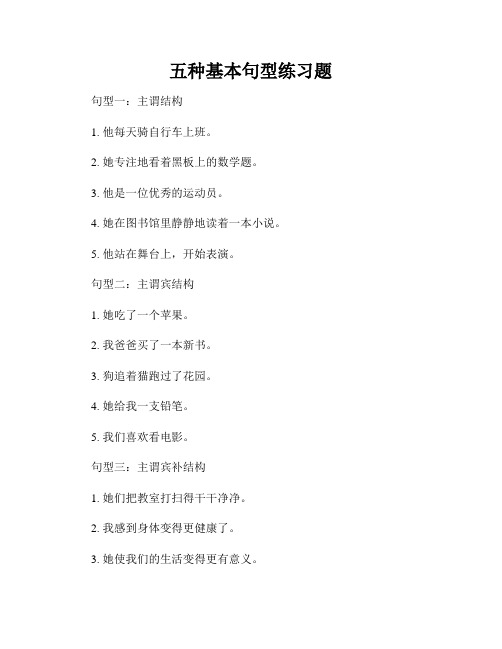
五种基本句型练习题句型一:主谓结构
1. 他每天骑自行车上班。
2. 她专注地看着黑板上的数学题。
3. 他是一位优秀的运动员。
4. 她在图书馆里静静地读着一本小说。
5. 他站在舞台上,开始表演。
句型二:主谓宾结构
1. 她吃了一个苹果。
2. 我爸爸买了一本新书。
3. 狗追着猫跑过了花园。
4. 她给我一支铅笔。
5. 我们喜欢看电影。
句型三:主谓宾补结构
1. 她们把教室打扫得干干净净。
2. 我感到身体变得更健康了。
3. 她使我们的生活变得更有意义。
4. 他被选为班长。
5. 这只小鸟使整个森林变得生机勃勃。
句型四:主系表结构
1. 她是一位聪明的学生。
2. 这个包包看起来很漂亮。
3. 她的笑容让人感到温暖。
4. 这部电影让我流下了眼泪。
5. 这首歌曲让我回忆起过去的时光。
句型五:主谓双宾结构
1. 妈妈给了我一个礼物。
2. 他送给我一束鲜花。
3. 我们给孩子们买了一些玩具。
4. 奶奶经常做好吃的给我们。
5. 爸爸买了一张机票给我。
通过以上的练习题,我们可以巩固五种基本句型的用法。
掌握这些句型的使用,可以帮助我们构建准确、通顺的句子,使我们的表达更加准确和流畅。
希望大家能够认真练习并灵活运用这些句型,提高自
己的写作和口语能力。
通过不断的练习和实践,我们一定能够取得进步!。
写作句子结构(基础篇)
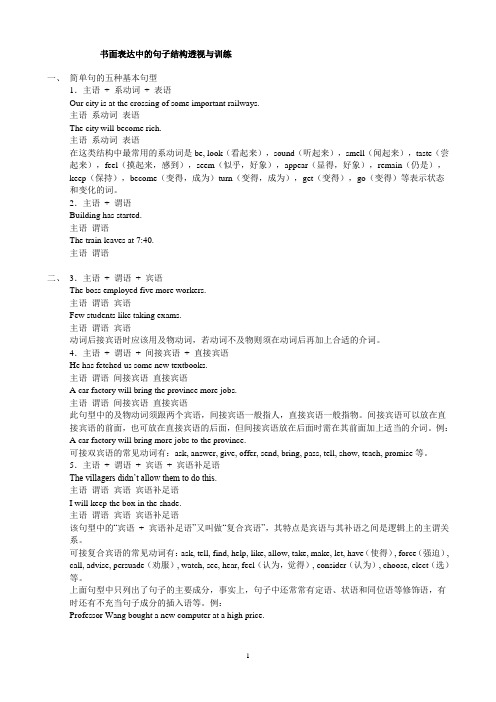
书面表达中的句子结构透视与训练一、简单句的五种基本句型1.主语+ 系动词+ 表语Our city is at the crossing of some important railways.主语系动词表语The city will become rich.主语系动词表语在这类结构中最常用的系动词是be, look(看起来),sound(听起来),smell(闻起来),taste(尝起来),feel(摸起来,感到),seem(似乎,好象),appear(显得,好象),remain(仍是),keep(保持),become(变得,成为)turn(变得,成为),get(变得),go(变得)等表示状态和变化的词。
2.主语+ 谓语Building has started.主语谓语The train leaves at 7:40.主语谓语二、3.主语+ 谓语+ 宾语The boss employed five more workers.主语谓语宾语Few students like taking exams.主语谓语宾语动词后接宾语时应该用及物动词,若动词不及物则须在动词后再加上合适的介词。
4.主语+ 谓语+ 间接宾语+ 直接宾语He has fetched us some new textbooks.主语谓语间接宾语直接宾语A car factory will bring the province more jobs.主语谓语间接宾语直接宾语此句型中的及物动词须跟两个宾语,间接宾语一般指人,直接宾语一般指物。
间接宾语可以放在直接宾语的前面,也可放在直接宾语的后面,但间接宾语放在后面时需在其前面加上适当的介词。
例:A car factory will bring more jobs to the province.可接双宾语的常见动词有:ask, answer, give, offer, send, bring, pass, tell, show, teach, promise等。
句子基本结构-成分划分-练习
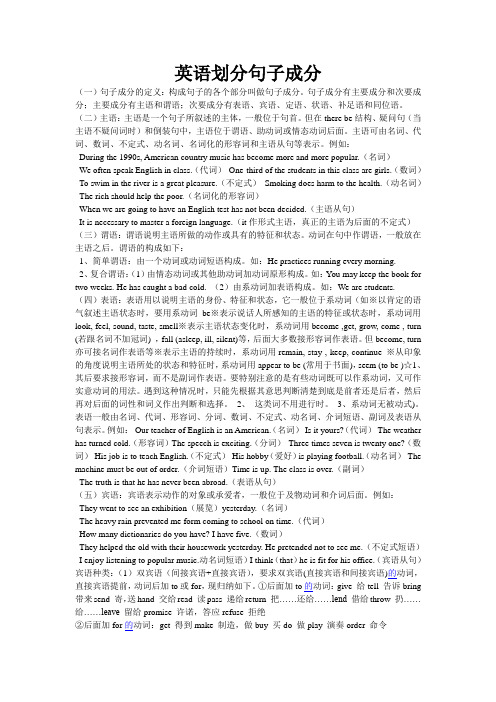
英语划分句子成分(一)句子成分的定义:构成句子的各个部分叫做句子成分。
句子成分有主要成分和次要成分;主要成分有主语和谓语;次要成分有表语、宾语、定语、状语、补足语和同位语。
(二)主语:主语是一个句子所叙述的主体,一般位于句首。
但在there be结构、疑问句(当主语不疑问词时)和倒装句中,主语位于谓语、助动词或情态动词后面。
主语可由名词、代词、数词、不定式、动名词、名词化的形容词和主语从句等表示。
例如:During the 1990s, American country music has become more and more popular.(名词)We often speak English in class.(代词)One-third of the students in this class are girls.(数词)To swim in the river is a great pleasure.(不定式)Smoking does harm to the health.(动名词)The rich should help the poor.(名词化的形容词)When we are going to have an English test has not been decided.(主语从句)It is necessary to master a foreign language.(it作形式主语,真正的主语为后面的不定式)(三)谓语:谓语说明主语所做的动作或具有的特征和状态。
动词在句中作谓语,一般放在主语之后。
谓语的构成如下:1、简单谓语:由一个动词或动词短语构成。
如:He practices running every morning.2、复合谓语:(1)由情态动词或其他助动词加动词原形构成。
如:You may keep the book for two weeks. He has caught a bad cold. (2)由系动词加表语构成。
基础语法句子结构
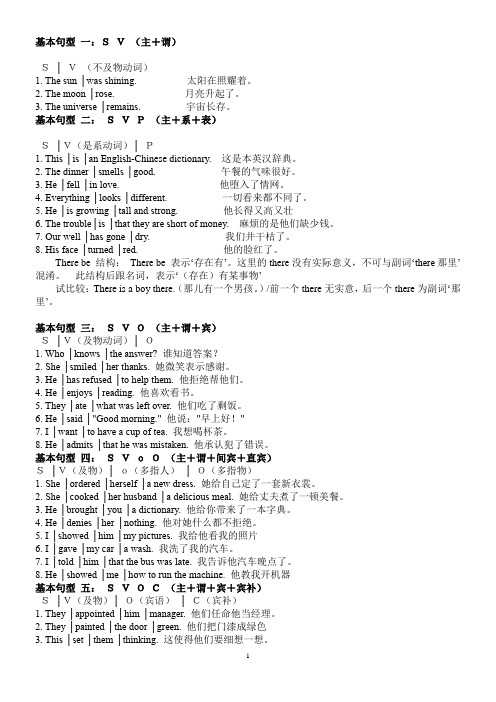
基本句型一:SV(主+谓)S│ V(不及物动词)1. The sun │was shining. 太阳在照耀着。
2. The moon │rose. 月亮升起了。
3. The universe │remains. 宇宙长存。
基本句型二:SVP(主+系+表)S│V(是系动词)│ P1. This │is │an English-Chinese dictionary. 这是本英汉辞典。
2. The d inner │smells │good. 午餐的气味很好。
3. He │fell │in love. 他堕入了情网。
4. Everything │looks │different. 一切看来都不同了。
5. He │is growing │tall and strong. 他长得又高又壮6. The trouble│is │that they are short of money. 麻烦的是他们缺少钱。
7. Our well │has gone │dry. 我们井干枯了。
8. His face │turned │red. 他的脸红了。
There be 结构:There be 表示‘存在有’。
这里的there没有实际意义,不可与副词‘there那里’混淆。
此结构后跟名词,表示‘(存在)有某事物’试比较:There is a boy there.(那儿有一个男孩。
)/前一个there无实意,后一个there为副词‘那里’。
基本句型三:SVO(主+谓+宾)S│V(及物动词)│ O1. Who │knows │the answer? 谁知道答案?2. She │smiled │her thanks. 她微笑表示感谢。
3. He │has refused │to help them. 他拒绝帮他们。
4. He │enjoys │reading. 他喜欢看书。
5. They │ate │what was left over. 他们吃了剩饭。
简单句的五种基本结构讲与练

三、句型3:SP: Subject (主语) + Link. V(系动词) + Predicate(表语)
这种句型主要用来表示主语的特点、身份等。其系动词一 般可分为以下三类:
1.渐变类系动词:become, come, fall, get, go, grow, turn 2.感官系动词:feel(感到,摸起来), look(看起来), taste (尝起来), sound(听起来), smell(闻起来) 3.保持类系动词:keep(保持), remain(依然(短语)等来充当。如: He’s a chemist. 他是个化学家。
3.从句作宾语 I don't know what I should do next. 我不知道接下 来做什么。
练习二、把下面句子译成英语。
1. 我计划在即将到来的五一节去旅游。 2. 他给朋友写了一些信。 3. 这个博物馆很值得参观。 4. 我永远忘不了参观长城这件事。 5. 离开之前不要忘了关灯。 6. 我希望你能为我提一些宝贵建议。
简单句的五种基本结构讲与练
简单句是由一个主语(或并列主语)和一个谓语 (或并列谓语)构成的句子。简单句的谓语部分包 括谓语动词及宾语、宾语补足语、表语等不同句子 成分,不同谓语动词的不同组合形成简单句的基本 句型。
一、句型1:SV:Subject (主语) + Vi (谓语) 这种句型中的动词是不及物动词,不能直接带宾 语。常见的不及物动词有:agree, arrive, burn,
He handed me a cup of tea.
如果把直接宾语放在间接宾语之前,间接宾语前要加to或 for。
1.加to的主要动词有:give, hand, pass, lend, pay, read, sell, send, show, teach, tell, post,bring, take, leave, return write, throw, promise, refuse, allow, offer, pay等。
- 1、下载文档前请自行甄别文档内容的完整性,平台不提供额外的编辑、内容补充、找答案等附加服务。
- 2、"仅部分预览"的文档,不可在线预览部分如存在完整性等问题,可反馈申请退款(可完整预览的文档不适用该条件!)。
- 3、如文档侵犯您的权益,请联系客服反馈,我们会尽快为您处理(人工客服工作时间:9:00-18:30)。
用英语进行书面表达,涉及到英语知识的各个方面,掌握好英语句子结构是写好书面表达的基础。
以下根据现行中学英语教材,将各种句子归纳为十二类英语句型,前五类是最基本的英语句型,而其余几类句型和各种英语句子又都是这五类句型的扩展。
学习、掌握了这些基本句型,对于联词组句会大有帮助,也会促进英语作文能力的提高。
第一类句型主语+系动词+表语例句:You are a student./ He is no longer what he used to be./ The su n looks bright in the sky.练习:根据汉语意思重新组合下列各句(注意首词第一个字母要大写)1. to become a scientist, his, is, wish (他的愿望是当科学家。
)2. next year, fourteen, my son, will be (我儿子明年14岁。
)3. well, didn’t, yesterday, I, feel (我昨天感到不舒适。
)第二类句型主语+(不及物动词)谓语+(状语)例句:The sun has risen./ They worked day and night./ She stood smili ng at me.练习:根据汉语意思重新组合下列各句(注意首词第一个字母要大写)4. her husband, waited for, she, to come back(她等待着她丈夫回来。
)5. library, the, came, she, into (她进了图书馆。
)6. so as to, the first bus, got up early, he, catch (他起床很早,以便赶上头班公共汽车。
)第三类句型主语+(及物动词)谓语+宾语例句:She is watering the flowers./ She couldn’t keep back her tears. / We spend a lot of money on books.练习:根据汉语意思重新组合下列各句(注意首词第一个字母要大写)7. the students, doing, their homework, are (学生们正在做家庭作业。
)8. to do, each day, he, tried, a good deed (他努力争取每天做一件好事。
)9. before, remember, I, seeing, somewhere, her (我记得在哪儿见过她。
)第四类句型主语+(及物动词)谓语+间接宾语+直接宾语例句:He gave me some beautiful pictures./ Would you fetch some water for the children?/ She told the students (that) the old man was her f ather.练习:根据汉语意思重新组合下列各句(注意首词第一个字母要大写)10. the purse, handed, he, to the teacher (他把钱包交给了老师。
)11. whose order, we, is, it, will, show you (我们会让你看看,这是谁的命令。
)12. cost, the, bike, new, 300 yuan, him (买这辆自行车,他花了300元。
)第五类句型主语+(及物动词)谓语+宾语+宾补例句:The boy kicked the door open./ We thought it better for you to take the medicine in time./ The boss made the workers work long hours.练习:根据汉语意思重新组合下列各句(注意首词第一个字母要大写)13. monitor, him, of our class, we, elected (我们选举他当班长。
)14. he, her, to be a dancer, wanted (他想让她当个舞蹈家。
)15. it, a pity, consider, that, I, he has given up studying English (我认为他放弃学英语真可惜。
)第六类句型祈使句结构例句:Come in, please./ Be careful not to touch it./ Don’t read in a moving bus.练习:根据汉语意思重新组合下列各句(注意首词第一个字母要大写)16. piece, paper, pass, her of, a (递给她一张纸。
)17. be, silly, so, don’t (别这么傻。
)18. the boy, please, in, let (请让这孩子进去吧。
)第七类句型感叹句结构例句:What a silly boy he is!/ How wonderful to be invited to a palace ball!练习:根据汉语意思重新组合下列各句(注意首词第一个字母要大写)19. silly, a, is, he, boy, what (他是多么蠢的孩子呀!)20. hard, they, how, working, are (他们干得真起劲!)第八类句型疑问句结构例句:Were they busy yesterday?/ Which book is yours?/ Which is bigger, the sun or the moon?./ You are tired, aren’t you?练习:根据汉语意思重新组合下列各句(注意首词第一个字母要大写)21. go, with you, Tom, did, there (汤姆和你一起去那里了吗?)22. to school, yesterday, who, the earliest, came (谁昨天到校最早呀?)23. like, or, sports, you, do, music (你喜欢运动呢,还是喜欢音乐?)24. leave, wouldn’t, will you, for long, you (你不会离开太久,对吗?)第九类句型否定句结构例句:He is not an engineer./ I shall not ask him for help./ Nobody can work it out.练习:根据汉语意思重新组合下列各句(注意首词第一个字母要大写)25. on the table, a book, isn’t, there (桌上没有书。
)26. come to, yesterday, didn’t, he, school (他昨天没上学。
)27. from, is, none, the, of, students, Shanghai (这些学生没有一个是上海人。
)第十类句型并列句结构例句:Tears appeared in her eyes, but he did not notice it./ The composition is all right; however there is room for improvement./ We must hurry, or we’ll be late.练习:根据汉语意思重新组合下列各句(注意首词第一个字母要大写)28. spring, the trees, and, turned green, came (春天来了,树变绿了。
)29. nobody, found, so, he, he, went away, in the room (他发现室内无人,所以就走了。
)30. must be ill, didn’t, this morning, she, she come to school, for (她一定是病了,因为他今天上午没上学。
)第十一类句型复合句结构例句:Whether we can solve the difficulty still remains a question./ His suggestion is that we go to Beidaihe to spend our holidays./ I wish I could enter college./ The man who is standing by the door is our English teacher./ I’ll write to you as soon as I get there./ The news that the Chinese Women’s volley ball team has won the world’s championship soon spread over the whole country.练习:根据汉语意思重新组合下列各句(注意首词第一个字母要大写)31. to go, at once, wants, may, whoever, go (无论谁想走,就可以马上走。
)32. who, the question, have, is, a try, will, first (问题是谁先试一试。
)33. he, him, would, the king, set, replied, free, that (国王回答说,他会释放他的。
)34. I, in Swiss, bought, the watch, which, yesterday, is made (我昨天买的手表是瑞士造的。
)35. began to cry, when, saw, his mother, the boy, he (那男孩看到他妈妈时就哭了。
)36. the earth, the sun, we all, the fact, moves, know, that, around (我们知道这个事实:地球围绕太阳转。
)第十二类句型强调句结构例句:It was your sister that I met in the zoo yesterday./ It was yesterday that I met your sister in the zoo.练习:根据汉语意思重新组合下列各句(注意首词第一个字母要大写)37. they, who, it is, tomorrow, will have a meeting (就是他们明天要开会。
)38. the Second World War, that, was, it, died, he, during (他就是在第二次世界大战期间死的。
